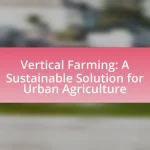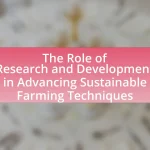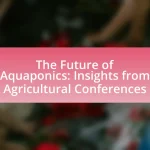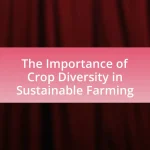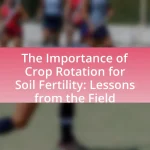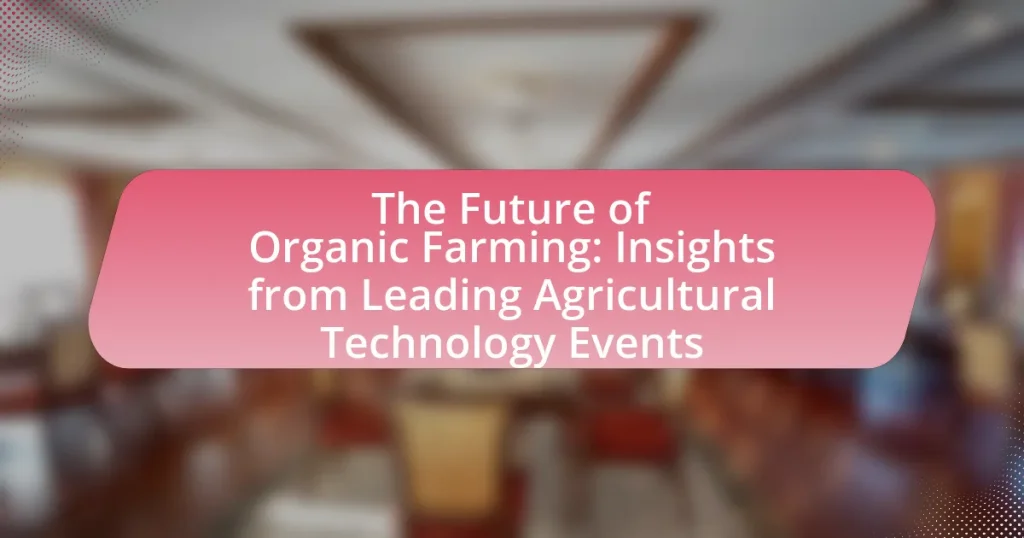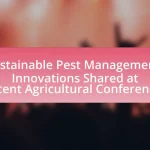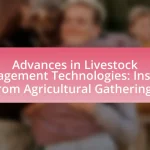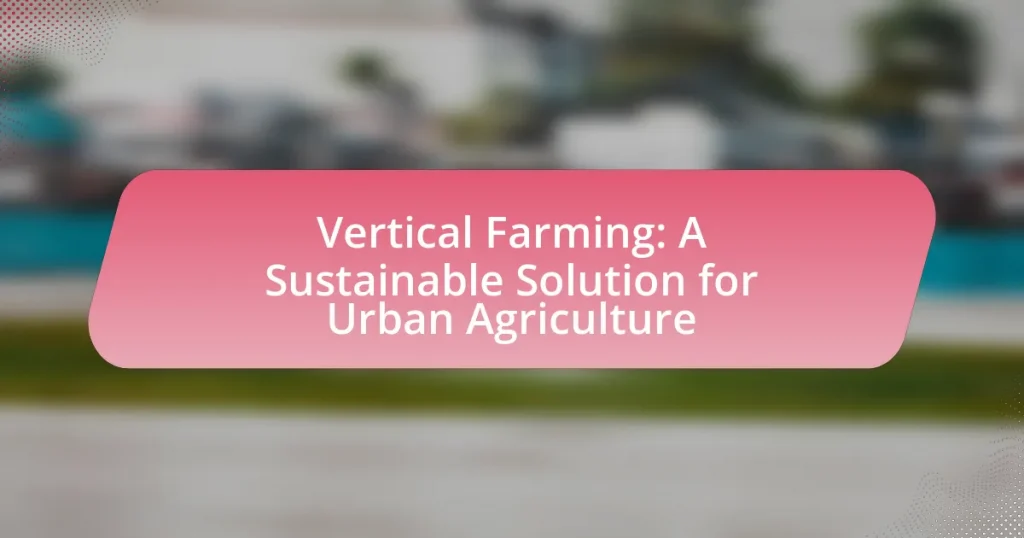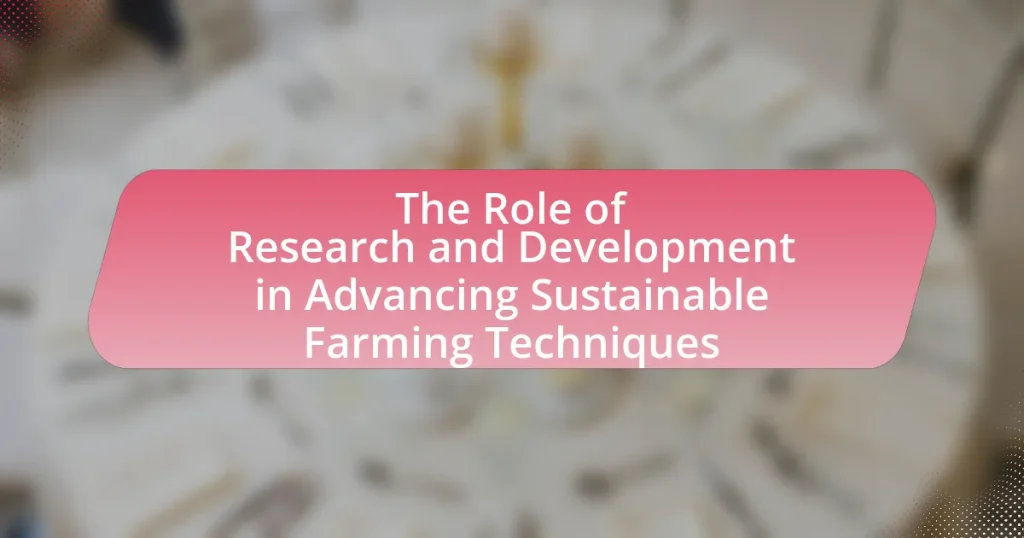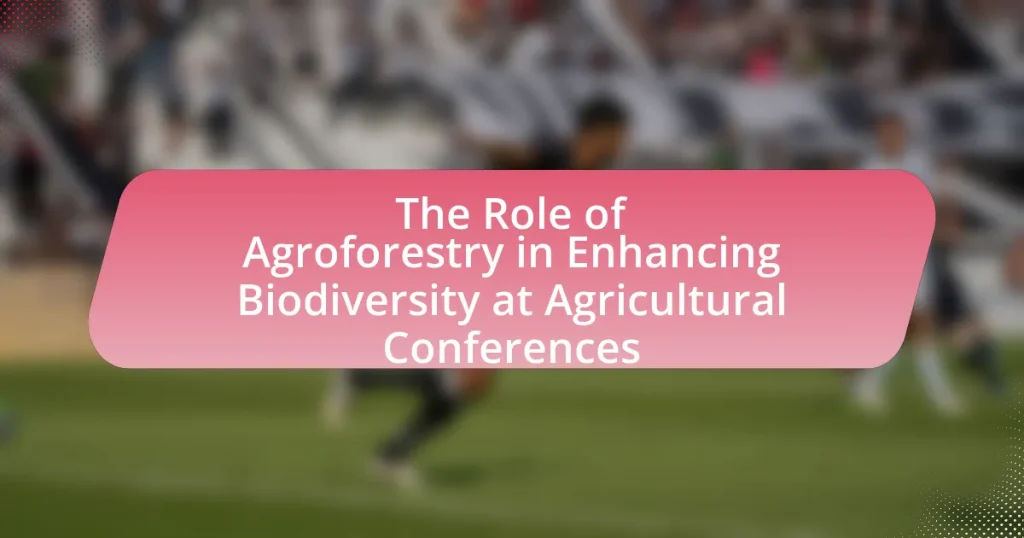The article focuses on the future of organic farming, highlighting its anticipated growth driven by technological advancements and increasing consumer demand for sustainable practices. It discusses the evolution of organic farming through precision agriculture, biotechnology, and data analytics, which enhance productivity while adhering to organic standards. Key themes include the importance of sustainability, the role of consumer preferences in shaping market trends, and the challenges faced by organic farmers, such as regulatory hurdles and technological barriers. Additionally, insights from leading agricultural technology events are presented, showcasing innovations that support organic farming practices and improve efficiency.
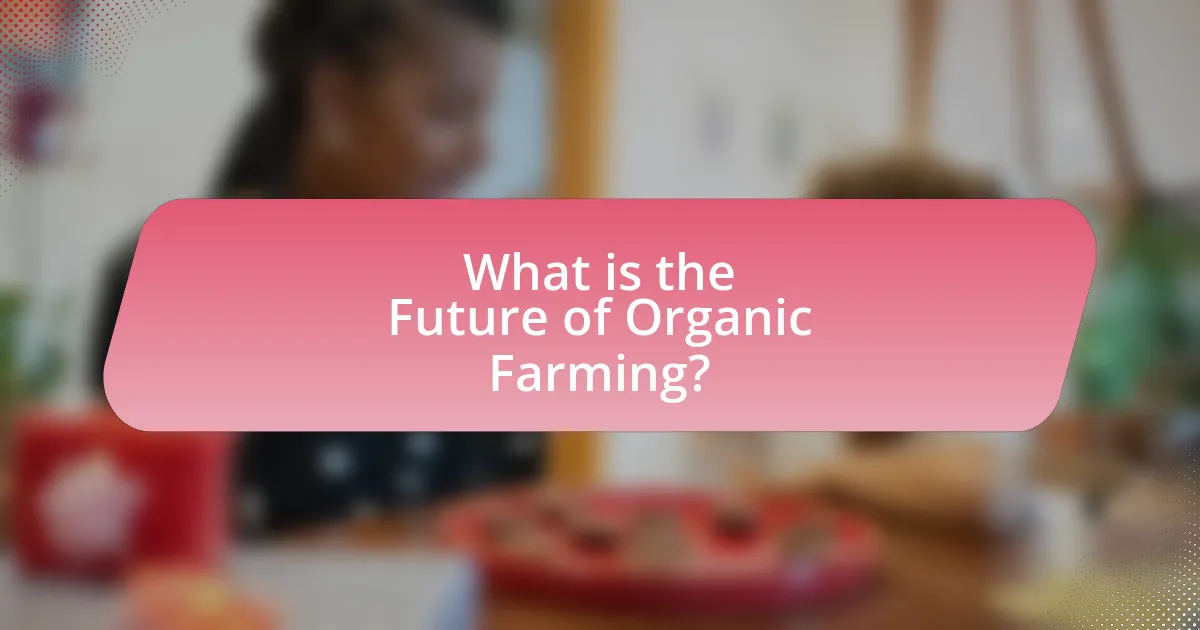
What is the Future of Organic Farming?
The future of organic farming is poised for significant growth and innovation, driven by advancements in agricultural technology and increasing consumer demand for sustainable practices. Research indicates that the global organic food market is expected to reach approximately $620 billion by 2026, reflecting a compound annual growth rate of around 10% from 2021. This growth is supported by technological innovations such as precision agriculture, which enhances crop yields while minimizing environmental impact, and the development of organic pest management solutions that reduce reliance on synthetic chemicals. Additionally, consumer awareness regarding health and environmental issues is propelling the shift towards organic products, as evidenced by a 2021 survey showing that 76% of consumers prioritize organic options for their health benefits.
How is organic farming evolving in the modern agricultural landscape?
Organic farming is evolving through the integration of advanced technologies and sustainable practices that enhance productivity and environmental stewardship. Innovations such as precision agriculture, which utilizes data analytics and IoT devices, allow organic farmers to optimize resource use and improve crop yields while adhering to organic standards. Additionally, the rise of regenerative agriculture practices, which focus on soil health and biodiversity, is gaining traction within the organic sector, promoting long-term sustainability. According to the 2021 Organic Trade Association report, organic food sales in the U.S. reached $61.9 billion, reflecting a growing consumer demand for organic products and driving further advancements in organic farming techniques.
What technological advancements are influencing organic farming practices?
Technological advancements influencing organic farming practices include precision agriculture, biotechnology, and data analytics. Precision agriculture utilizes GPS and IoT devices to optimize field-level management regarding crop farming, which enhances resource efficiency and reduces waste. Biotechnology, such as CRISPR gene editing, allows for the development of pest-resistant crops without synthetic chemicals, aligning with organic standards. Data analytics provides farmers with insights into soil health and crop performance, enabling informed decision-making that supports sustainable practices. These advancements collectively contribute to increased yields and reduced environmental impact in organic farming.
How do consumer preferences shape the future of organic farming?
Consumer preferences significantly shape the future of organic farming by driving demand for organic products, which influences farming practices and market strategies. As consumers increasingly prioritize health, sustainability, and environmental impact, organic farming practices are being adopted more widely to meet these preferences. For instance, a 2022 survey by the Organic Trade Association revealed that 82% of consumers consider organic food to be healthier, prompting farmers to transition to organic methods to capture this growing market. Additionally, the rise of e-commerce and direct-to-consumer sales channels allows organic farmers to connect with consumers more effectively, further reinforcing the shift towards organic farming.
Why is organic farming important for sustainability?
Organic farming is important for sustainability because it promotes ecological balance and biodiversity while reducing reliance on synthetic chemicals. This farming method enhances soil health through practices like crop rotation and composting, which improve nutrient cycling and reduce erosion. Research indicates that organic farms can support 34% more species than conventional farms, contributing to greater ecosystem resilience. Additionally, organic farming practices help mitigate climate change by sequestering carbon in the soil, with studies showing that organic soils can store up to 30% more carbon than conventional soils.
What role does organic farming play in environmental conservation?
Organic farming plays a crucial role in environmental conservation by promoting biodiversity, enhancing soil health, and reducing pollution. This agricultural practice avoids synthetic pesticides and fertilizers, which can harm ecosystems and water quality. For instance, studies show that organic farming can increase species richness in agricultural landscapes by up to 30%, supporting a wider range of flora and fauna. Additionally, organic methods improve soil structure and fertility through practices like crop rotation and composting, leading to better water retention and reduced erosion. These benefits contribute to a more sustainable agricultural system that aligns with conservation goals.
How does organic farming contribute to biodiversity?
Organic farming contributes to biodiversity by promoting diverse ecosystems through practices that enhance soil health, reduce chemical inputs, and support a variety of plant and animal species. This farming method encourages crop rotation, intercropping, and the use of cover crops, which help maintain soil fertility and prevent erosion, thereby creating habitats for various organisms. Research indicates that organic farms typically host 30% more species than conventional farms, as shown in a study published in the journal “Agriculture, Ecosystems & Environment” by Benis et al. (2020), which highlights the positive impact of organic practices on wildlife and plant diversity.
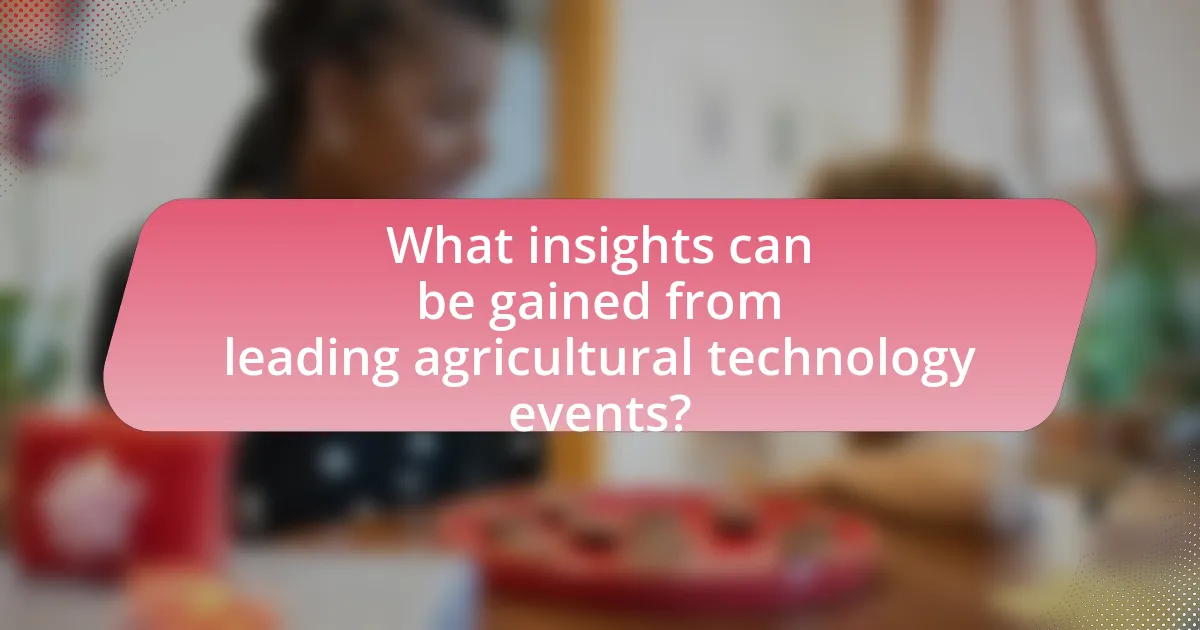
What insights can be gained from leading agricultural technology events?
Leading agricultural technology events provide insights into innovative practices, emerging technologies, and market trends that shape the future of organic farming. These events showcase advancements such as precision agriculture, which utilizes data analytics and IoT devices to optimize crop yields and resource management. For instance, the 2022 International Conference on Precision Agriculture highlighted how satellite imagery and drones can enhance soil health monitoring, leading to more sustainable farming practices. Additionally, networking opportunities at these events facilitate collaboration among farmers, researchers, and tech developers, fostering the exchange of best practices and solutions tailored to organic farming challenges.
How do agricultural technology events showcase innovations in organic farming?
Agricultural technology events showcase innovations in organic farming by providing platforms for industry leaders to present cutting-edge technologies and practices that enhance sustainable agriculture. These events feature demonstrations of precision farming tools, organic pest management solutions, and advancements in soil health monitoring, which are crucial for improving organic crop yields. For instance, the 2022 Organic Farming Conference highlighted the use of drones for crop monitoring and the integration of AI in soil analysis, illustrating how technology can optimize organic farming methods. Such showcases not only facilitate knowledge exchange among farmers, researchers, and technology developers but also promote the adoption of innovative practices that align with organic farming principles.
What are the key themes discussed at these events regarding organic farming?
Key themes discussed at these events regarding organic farming include sustainability, technological innovation, and market trends. Sustainability emphasizes the importance of environmentally friendly practices that enhance soil health and biodiversity. Technological innovation focuses on advancements such as precision agriculture, which utilizes data analytics and automation to optimize farming practices. Market trends highlight the increasing consumer demand for organic products, driving farmers to adapt their practices to meet these preferences. These themes reflect the evolving landscape of organic farming and its alignment with global agricultural goals.
How do networking opportunities at these events benefit organic farmers?
Networking opportunities at agricultural technology events benefit organic farmers by facilitating connections with industry experts, potential buyers, and fellow farmers. These interactions can lead to collaborations, sharing of best practices, and access to new markets. For instance, a study by the Organic Trade Association found that 70% of organic farmers who participated in networking events reported increased sales due to new partnerships formed at these gatherings. Additionally, networking allows farmers to stay informed about the latest technologies and trends, enhancing their competitiveness in the market.
What are the challenges highlighted at agricultural technology events for organic farming?
The challenges highlighted at agricultural technology events for organic farming include pest management, soil health, and market access. Pest management remains a significant issue due to the limited availability of organic pesticides, which can lead to crop losses. Soil health is critical, as organic farming relies on maintaining nutrient-rich soils, yet many farmers struggle with soil degradation and fertility. Market access poses another challenge, as organic products often face competition from conventional farming, making it difficult for organic farmers to secure fair prices and distribution channels. These challenges are consistently discussed at events, emphasizing the need for innovative solutions and support systems to enhance the viability of organic farming.
What technological barriers do organic farmers face?
Organic farmers face several technological barriers, including limited access to advanced agricultural technologies, inadequate data management systems, and challenges in pest and disease management. These barriers hinder their ability to optimize yields and maintain sustainable practices. For instance, organic farmers often lack access to precision agriculture tools that can enhance efficiency and reduce resource use, which are more readily available to conventional farmers. Additionally, the absence of robust data analytics can impede decision-making processes, making it difficult for organic farmers to track crop performance and environmental conditions effectively. Furthermore, organic pest management solutions may not be as technologically advanced as synthetic alternatives, leading to increased vulnerability to pests and diseases.
How do regulatory challenges impact the future of organic farming?
Regulatory challenges significantly impact the future of organic farming by creating barriers to entry and compliance for farmers. These challenges include stringent certification processes, evolving standards, and varying regulations across regions, which can increase operational costs and complexity for organic producers. For instance, the USDA’s National Organic Program requires rigorous adherence to specific practices, which can deter new farmers from entering the organic market. Additionally, inconsistent regulations between countries can complicate international trade for organic products, limiting market access and growth opportunities. Such regulatory hurdles can stifle innovation and reduce the competitiveness of organic farming in the broader agricultural landscape.
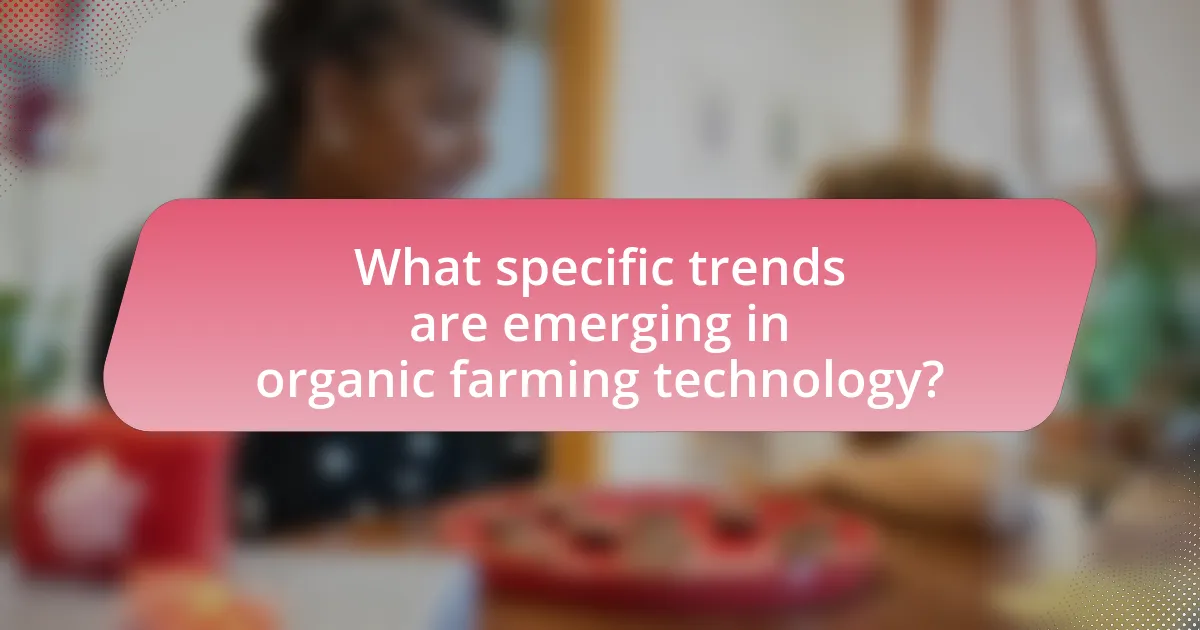
What specific trends are emerging in organic farming technology?
Emerging trends in organic farming technology include the increased use of precision agriculture, automation, and data analytics. Precision agriculture utilizes GPS and IoT devices to optimize resource use, enhancing crop yields while minimizing environmental impact. Automation, through robotics and drones, streamlines tasks such as planting, monitoring, and harvesting, improving efficiency. Data analytics enables farmers to make informed decisions based on real-time data, leading to better management of crops and resources. According to a report by Research and Markets, the global precision agriculture market is expected to grow significantly, indicating a strong trend towards technology adoption in organic farming.
How is precision agriculture being applied to organic farming?
Precision agriculture is being applied to organic farming through the use of advanced technologies such as GPS, remote sensing, and data analytics to optimize crop management. These technologies enable organic farmers to monitor soil health, moisture levels, and crop growth in real-time, allowing for targeted interventions that enhance productivity while adhering to organic standards. For instance, precision irrigation systems can reduce water usage by delivering the exact amount needed, which is crucial for organic practices that avoid synthetic inputs. Additionally, data-driven insights help farmers make informed decisions about crop rotation and pest management, ultimately improving yields and sustainability in organic farming.
What tools are available for organic farmers to enhance crop management?
Organic farmers can enhance crop management using tools such as precision agriculture technologies, organic fertilizers, cover crops, and integrated pest management systems. Precision agriculture technologies, including GPS and remote sensing, allow farmers to monitor crop health and optimize resource use, leading to increased yields and reduced waste. Organic fertilizers, derived from natural sources, improve soil health and nutrient availability, which is crucial for sustainable farming practices. Cover crops help prevent soil erosion, improve soil structure, and enhance biodiversity, contributing to a healthier ecosystem. Integrated pest management systems combine biological, cultural, and mechanical practices to control pests while minimizing chemical use, aligning with organic farming principles. These tools collectively support organic farmers in achieving efficient and sustainable crop management.
How does data analytics improve decision-making in organic farming?
Data analytics improves decision-making in organic farming by providing actionable insights derived from data collected on crop performance, soil health, and environmental conditions. By analyzing this data, farmers can optimize resource allocation, enhance crop yields, and implement targeted pest management strategies. For instance, a study by the University of California found that data-driven decisions can increase organic crop yields by up to 20% compared to traditional methods. This evidence demonstrates that leveraging data analytics leads to more informed and effective farming practices, ultimately contributing to sustainable agricultural outcomes.
What role does automation play in the future of organic farming?
Automation plays a crucial role in the future of organic farming by enhancing efficiency and precision in agricultural practices. Automated systems, such as drones and robotic harvesters, enable farmers to monitor crop health, optimize resource use, and reduce labor costs. For instance, a study by the University of California found that the use of automated irrigation systems can lead to a 30% reduction in water usage while maintaining crop yield. This integration of technology not only supports sustainable practices but also aligns with the increasing demand for organic produce, as it allows for more effective pest management and soil health monitoring without the use of synthetic chemicals.
What types of automation technologies are being adopted by organic farmers?
Organic farmers are adopting various automation technologies, including precision agriculture tools, robotic systems, and automated irrigation systems. Precision agriculture technologies utilize data analytics and GPS to optimize planting, fertilization, and harvesting, enhancing crop yields while minimizing resource use. Robotic systems, such as autonomous tractors and harvesters, are increasingly employed to reduce labor costs and improve efficiency. Automated irrigation systems, which use sensors and weather data to manage water usage, help conserve water and ensure optimal soil moisture levels. These technologies collectively support sustainable practices in organic farming, aligning with the industry’s focus on environmental stewardship and efficiency.
How can automation improve efficiency and reduce labor costs in organic farming?
Automation can significantly improve efficiency and reduce labor costs in organic farming by streamlining processes such as planting, monitoring, and harvesting. For instance, automated planting systems can precisely place seeds at optimal depths and spacing, which enhances crop yields and minimizes waste. Additionally, the use of drones for crop monitoring allows farmers to assess plant health and soil conditions in real-time, enabling timely interventions that can prevent crop loss.
Research indicates that farms utilizing automation can reduce labor costs by up to 30%, as machines can perform tasks that traditionally required multiple workers. A study by the USDA found that the adoption of automated technologies in agriculture leads to increased productivity, with some farms reporting a 20% increase in output. This efficiency not only lowers operational costs but also allows farmers to allocate resources more effectively, ultimately contributing to the sustainability of organic farming practices.
What best practices can organic farmers adopt from insights gained at technology events?
Organic farmers can adopt precision agriculture techniques from insights gained at technology events. These techniques involve using data analytics, GPS technology, and remote sensing to optimize crop yields while minimizing resource use. For instance, studies show that precision agriculture can increase crop productivity by 10-20% and reduce input costs by up to 15%, demonstrating its effectiveness in enhancing sustainability and profitability. Additionally, organic farmers can implement integrated pest management strategies learned from technology events, which combine biological control, habitat manipulation, and resistant crop varieties to manage pests more effectively without synthetic chemicals. This approach aligns with organic farming principles and has been shown to reduce pest populations significantly while maintaining crop health.
